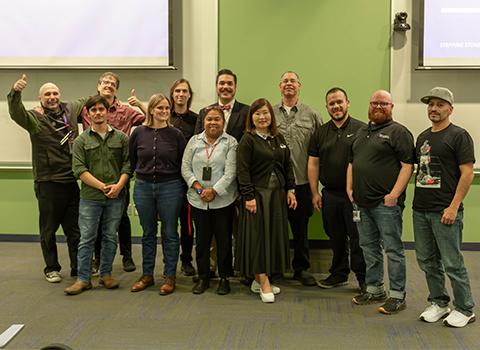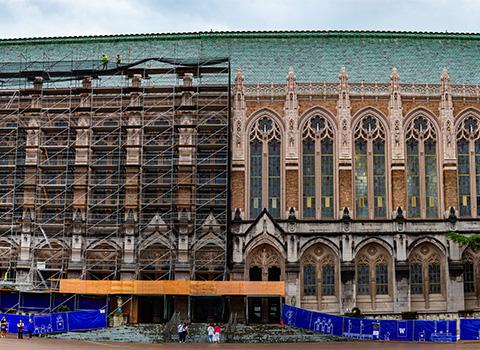Meany Welcomes MiniMax

Building Services Department staff members assemble bins during a MiniMax installation in the Meany Center for Performing Arts. Photo: Daimon Eklund, UW Sustainability
Meany Center for the Performing Arts is now among the majority of buildings on campus that participate in MiniMax, a waste reduction program sponsored and facilitated by UW Recycling. It is through this program that UW Recycling works toward reaching its goal of 70% waste diversion by the year 2020.
Faculty, staff, students and the patrons that the Meany Center hosts now have the opportunity to support sustainable choices in how they sort their waste.
MiniMax is a deskside, self-service waste collection system based on the idea of minimizing waste and maximizing recycling. Building occupants take responsibility for emptying their own bins (a 28-quart recycling bin and a smaller 3-quart mini garbage bin) into centralized recycling and garbage containers. This self-service model builds awareness around recycling and promotes personal responsibility for waste generation. It also allows custodians to redirect their collection efforts to tasks more essential to the health of the University. Since the bins are unlined, the number of plastic liner bags that go to the landfill are significantly reduced.
James Fesalbon, fiscal specialist at Meany Center of the Performing Arts, initially reached out to UW Recycling in July 2016 with questions about how the MiniMax program works. From there, Erica Bartlett, MiniMax program manager, met Fesalbon for a walk-through to assess the building’s waste and recycling infrastructure.
A formal site-visit in collaboration with UW Recycling’s sister unit within Building Services Department—Custodial Services—took place in September 2016, since converting a building to MiniMax is about more than bins alone. The entire building’s waste infrastructure is reviewed and bins are moved, removed or added to allow for best coverage. The goal is to ensure there are common area bins (recycling, garbage and compost) available to all building occupants for emptying their own deskside bins.

A new MiniMax bin replaces two large trash bins inside the Meany Center ticket office (left). Paper towel composting is part of a MiniMax conversion (right).
The Process
The Process
“When I worked for Genome Sciences in the Foege Building, they already implemented MiniMax. When I moved to Meany Center, MiniMax was not yet installed, so I felt uncomfortable going from wide-availability to minimal-availability of common bins,” commented Fesalbon. “Since the MiniMax installation has been relatively seamless, my hope is for ArtsUW Ticket Office to be the next building to be converted. Then Meany Center would be in a position to score high on its Green Office Certification.”
Due to the large scale of Meany’s facility, the conversion was split up over the course of two days. Staff members from Custodial Services and Meany Hall collaborated with UW Recycling in delivering and assembling new bins, as well as removing old ones. In total, 40 offices or individual work stations in Meany Hall were converted to the MiniMax system (where custodial-serviced trash cans were exchanged for a self-serviced recycling container and small waste bin attachment).
“James Fesalbon did a phenomenal job coordinating Meany Hall to adopt MiniMax and was involved every step of the way—start to finish—including physically helping remove/deliver containers during the install!,” said Bartlett. “He was there unlocking doors, providing additional onsite education on the changes being made, and helping move bins around! James did such a good job communicating with all department administrators throughout the entire process: gathering initial input and feedback, coordinating meetings to go over proposed changes, and providing follow-up requests if additional work was needed. It was such a joy to have him help; he made our work that much more efficient,” said Bartlett.
“By collectively sending less material to the landfill—capturing it as recycling or compost—our campus community saves UW money and benefits our environment,” said Bartlett. “There are now compost and recycling bins in all of Meany’s kitchens, break rooms, hallways and areas where students/faculty/staff gather and eat, which comes to a total of 32 compost bins.”
Sustainability in the Arts
Sustainability in the Arts
Connecting artistic communities at the UW who are working toward sustainability is the goal of a new initiative backed by UW Sustainability through what is known as Sustainability in the Arts (SITA). This effort will explore sustainability operations efforts as well as how creative works can incorporate sustainability themes.
“I definitely noticed the new trash, recycling, and compost bins at the start of winter quarter,” said Rosy Gentle, a dance student focusing her capstone project on SITA. “I think the biggest difference has been having compost for the paper towels in the bathrooms, many fellow students I know have been excited about this change. Many more options for recycling around the building also make it easier to be mindful of where your waste is going,” said Gentle.
When it comes to sustainability, everyday actions add up to a big impact.
“As Meany Center has a global outlook to bring artists from around the world to the UW stage and the audience members to experience these artists, the employees who work here have an increased sense of personal responsibility of waste diversion that not only affects us here in Seattle, but around the world,” said Fesalbon.



